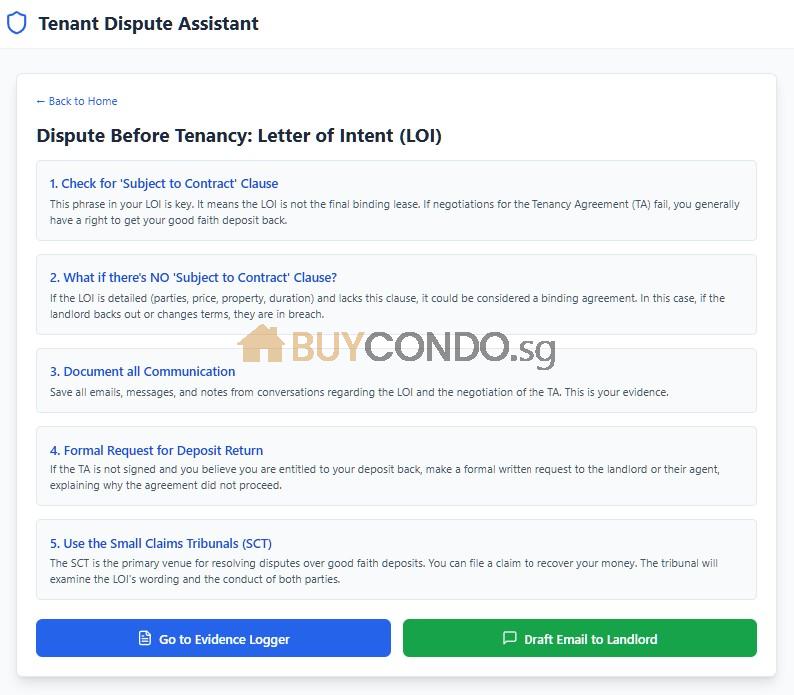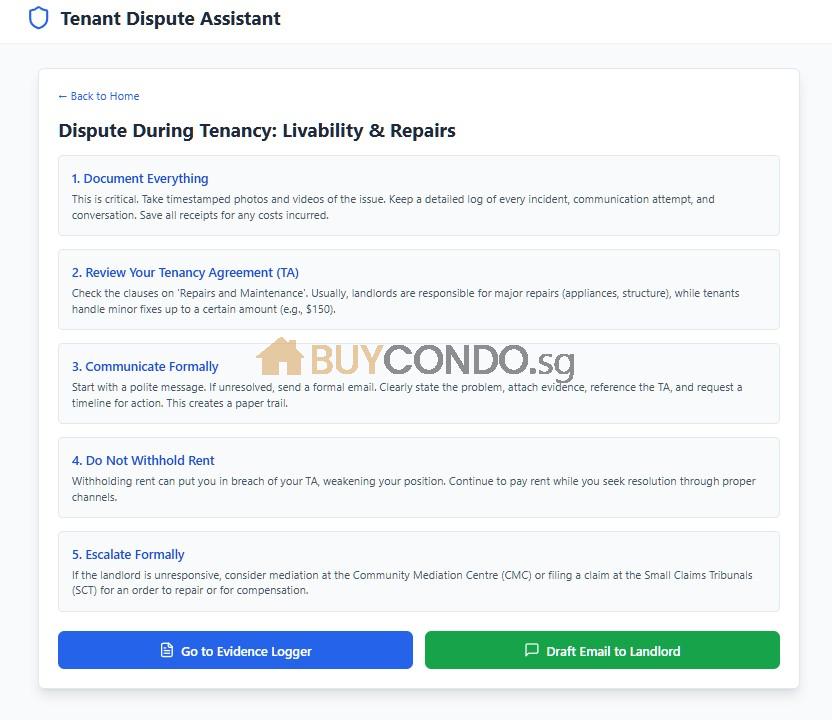Covenant for Quiet Enjoyment Clause in Tenancy Agreement
You found the perfect apartment. The location is ideal, the view is great, and you signed the Tenancy Agreement (TA) with excitement, envisioning a peaceful haven to call your own. But a few months in, the dream starts to fray. The air-conditioner keeps breaking down in the sweltering heat, a persistent leak in the bathroom ceiling is starting to grow mould, and the landlord is slow to respond, if at all.
Suddenly, your home feels less like a sanctuary and more like a source of stress. You’re in a landlord-tenant dispute.
This situation is frustratingly common. When the basic livability of your rented home is compromised, it’s crucial to know your rights and the correct steps to take. Here’s a guide to navigating these choppy waters and protecting your right to a safe and habitable home.
The Foundation: Your Tenancy Agreement (TA) and the “Covenant for Quiet Enjoyment”
Before you do anything, pull out your Tenancy Agreement. This document is the legal backbone of your rental. Pay close attention to clauses related to:
- Repairs and Maintenance: The TA should specify who is responsible for repairs. Often, it includes a clause where the tenant covers minor repairs up to a certain amount (e.g., $150-$300), while the landlord is responsible for major issues and structural repairs, including the upkeep of essential fittings like air-conditioners and water heaters.
- Covenant for Quiet Enjoyment: This is a key legal term, but the idea is simple. Your landlord must ensure that you can live in the property peacefully without undue disturbance or interference. A home with persistent, unresolved problems—like major leaks, pest infestations, or non-functional essential services—can be considered a breach of this covenant because it significantly impacts your ability to “enjoy” the property.
Your Step-by-Step Action Plan for Resolving Disputes
When an issue of livability arises, a knee-jerk emotional reaction is understandable but rarely effective. Follow a structured, documented approach.
Step 1: Document Everything. No, Everything.
This is the single most important step. Evidence is your best friend in any dispute.
- Photos and Videos: Take clear pictures and videos of the problem.
- Create a Log: Keep a written log with dates and times.
- Keep Receipts: If you are forced to pay for a repair, keep the receipts.
Step 2: Communicate Clearly and in Writing
Start with a calm, professional approach.
- Initial Contact: A WhatsApp message or a phone call is fine for the first attempt.
- Follow Up with an Email: If the issue isn’t addressed promptly, send a formal email. This creates a digital paper trail.
Step 3: Formal Escalation (If Needed)
If your emails and calls are ignored, it’s time to escalate.
- Community Mediation Centre (CMC): A neutral third-party mediator will help facilitate a conversation. (This optional is provided if both parties are keen to seek out a resolution, it would be best to also state this option in the tenancy agreement)
- Small Claims Tribunals (SCT): For monetary claims or orders for the landlord to fulfil their obligations.

Question: The Pre-Tenancy Limbo: Disputes After the Letter of Intent (LOI) : Covenant for Quiet Enjoyment Clause in Tenancy Agreement
What happens if the dispute arises before you even move in? You’ve signed a Letter of Intent (LOI) and paid a good faith deposit, but before the Tenancy Agreement (TA) is signed, the landlord tries to change the terms, or you discover a major problem with the unit they didn’t disclose. This is a tricky but common scenario.
The legal standing of your LOI is the critical factor here.
Scenario 1: Your LOI contains a “Subject to Contract” Clause
This is the most common situation. The phrase “subject to contract” or “subject to the signing of the Tenancy Agreement” means the LOI is not a fully binding contract for the lease itself. It’s an agreement to negotiate in good faith towards the final TA.
- What it means: If you and the landlord cannot agree on the final terms of the TA, there is no binding lease.
- What to do: Your primary dispute will likely be over the return of your good faith deposit. Your argument is strong: since the condition (signing the TA) was not met, the deposit should be returned in full. If the landlord refuses, arguing you backed out, your recourse is the Small Claims Tribunals.
Scenario 2: Your LOI does NOT contain a “Subject to Contract” Clause
If the LOI lacks this clause and is sufficiently detailed (containing parties, property, price, and duration), it can potentially be considered a binding agreement in itself.
- What it means: Both you and the landlord could be legally bound to the terms laid out in the LOI, even without a formal TA. If the landlord backs out or tries to change a core term (like the rent), they could be in breach. Conversely, if you back out, you risk forfeiting your deposit.
- What to do: This is a more complex legal situation. You should immediately communicate in writing that you consider the LOI terms to be agreed upon and expect the landlord to proceed. If they refuse, the dispute again moves towards the return of your deposit and potential damages.
Using the Small Claims Tribunals (SCT) for LOI Disputes
The SCT is the correct venue to resolve disputes over good faith deposits. You can file a claim for the return of your deposit.
- Is there a precedent? The SCT decides cases on their specific facts, but there are established principles. The Tribunal will look at the wording of the LOI as the primary piece of evidence. They will examine:
- Was there a “subject to contract” clause? This is often the deciding factor.
- What were the conditions for the forfeiture of the deposit as written in the LOI?
- Did one party act in bad faith? For example, did the landlord immediately re-list the property at a higher price after you signed the LOI? Or did the tenant back out for a reason completely unrelated to the tenancy?
- The tribunal aims for a just and equitable outcome. If the “subject to contract” clause exists and negotiations simply broke down, the tribunal very often orders the deposit to be returned.
Key takeaway for the LOI stage: Always ensure the LOI clearly states the conditions under which your good faith deposit is to be refunded. A well-written clause stating the deposit is refundable if the TA is not signed by a certain date for any reason is your best protection.
A Note on Prevention
The best way to handle a dispute is to avoid it in the first place.
- Inspect Thoroughly: Before signing anything (LOI or TA), inspect the property meticulously.
- Take Handover Photos: On the day you move in, take pictures of every room and any existing defects.
- Clarify Clauses: If you don’t understand a clause, ask for clarification before you sign.
Living in a rented property should be a positive experience. By understanding your rights, communicating effectively, and keeping meticulous records, you can tackle tenancy issues with confidence and work towards restoring the peace and comfort you deserve in your home.
Tenant Dispute Assistant (Click Here)
Disclaimer: This blog post is for informational purposes only and does not constitute legal advice. Disputes involving Letters of Intent can be complex. You should consult with a legal professional for advice specific to your situation.














